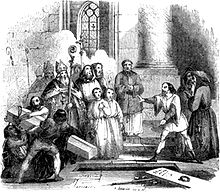- Clameur de haro
-
 Asselin objects to the burial of William the Conqueror in a church he claims was built on his unlawfully obtained land: "the ground upon which you are standing, was the site of my father's dwelling. This man, for whom you ask our prayers, took it by force from my parent; by violence he seized, by violence he retained it; and, contrary to all law and justice, he built upon it this church, where we are assembled. Publicly, therefore, in the sight of God and man, do I claim my inheritance, and protest against the body of the plunderer being covered with my turf."[citation needed]
Asselin objects to the burial of William the Conqueror in a church he claims was built on his unlawfully obtained land: "the ground upon which you are standing, was the site of my father's dwelling. This man, for whom you ask our prayers, took it by force from my parent; by violence he seized, by violence he retained it; and, contrary to all law and justice, he built upon it this church, where we are assembled. Publicly, therefore, in the sight of God and man, do I claim my inheritance, and protest against the body of the plunderer being covered with my turf."[citation needed]
The Clameur de Haro (French pronunciation: [klamœʁ də aʁo]) is an ancient legal injunction of restraint employed by a person that believes they are being wronged by another at that moment. It survives as a fully enforceable law to this day in the legal systems of Jersey and Guernsey, and is used, albeit infrequently, for matters affecting land.
Contents
History
Based in Norman law, it is often thought to be a plea for justice to Rollo of Normandy, the 10th century founder of the Duchy of Normandy, interpreted as a contraction of "Ha-Rollo". The view that it is a plea to Rollo is now believed to be incorrect. 'Harrow' meaning 'give chase' was commonly used in medieval England and France as a cry to others to drop what they were doing and assist in the apprehension of a miscreant.[1] It survives in English hunting parlance as 'Halloo' and possibly in the word 'harrier' as a name for a runner.
Procedure
The procedure is performed on one's knees before witnesses, in the presence of the wrong-doer and in the location of the offence. The "Criant" with his hand in the air must call out —
Haro! Haro! Haro! A l'aide, mon Prince, on me fait tort.
(Hear me! Hear me! Hear me! Come to my aid, my Prince, for someone does me wrong.)Following this, the Criant must recite the Lord's Prayer in French.
Notre Père qui es aux cieux. Ton nom soit sanctifié. Ton règne vienne. Ta volonté soit faite sur la terre comme au ciel. Donne-nous aujourd'hui notre pain quotidien. Et nous pardonne nos offenses, comme nous pardonnons à ceux qui nous ont offensés. Et ne nous induis point en tentation, mais délivre-nous du mal. Car à toi est le règne, la puissance et la gloire, aux siècles des siècles.On hearing this, the alleged wrong-doer must cease their challenged activities until the matter is adjudicated in court. Failure to stop will lead to the imposition of a fine, whether they were in the right or not. If the Criant is found to have called Haro without a valid reason, they in turn must pay a penalty.
The Clameur in Guernsey requires that a Grace be said after the Lord's Prayer:
La Grâce de Notre Seigneur Jésus Christ,
la dilection de Dieu et la communication de Saint Esprit
soit avec nous tous éternellement. Amen.[2]See also
Notes
- ^ http://www.clameur.gg/history.html
- ^ Appendix, Laws of Guernsey
References
- Dawes, Advocate Gordon, Laws of Guernsey, (Hart Publishing, 2003). ISBN 1841133965
External links
- Jersey Legal Information Board
- Jersey Citizens Advice Bureau
- Criants, Clamerists and the Clameur de Haro in the Channel Islands
 Chisholm, Hugh, ed (1911). "Haro, Clameur de". Encyclopædia Britannica (11th ed.). Cambridge University Press.
Chisholm, Hugh, ed (1911). "Haro, Clameur de". Encyclopædia Britannica (11th ed.). Cambridge University Press.
Categories:- Jersey law
- Bailiwick of Guernsey
- Normandy
- Judicial remedies
- French legal terms
Wikimedia Foundation. 2010.
